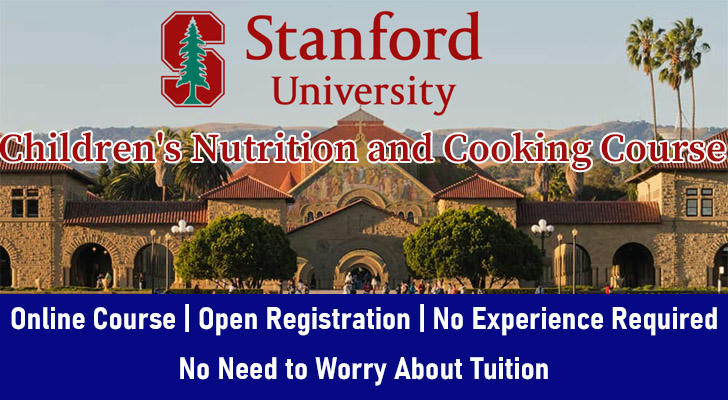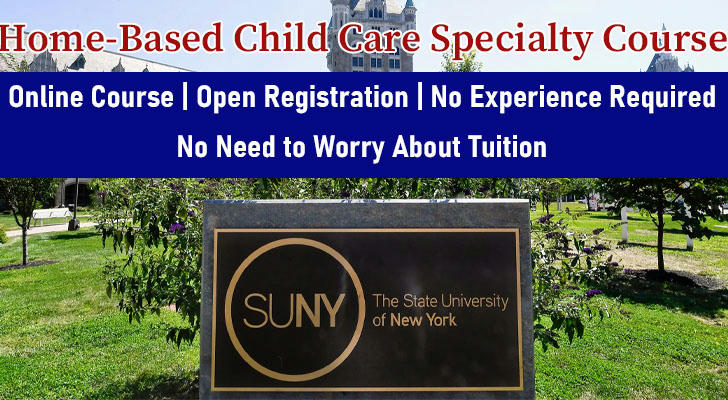💼 Boost Your Childcare Credentials with SUNY’s Training and Stanford’s Nutrition Course
Open enrollment | Certificates available | Study at your own pace | No tuition fees to worry about
Home-Based Child Care Specialty Course -SUNY
Children's Nutrition and Cooking -Stanford

Demand for qualified Early Childhood Education Assistants is rapidly increasing across the United States. Yet many learners encounter obstacles such as rigid training schedules, unclear credentialing pathways, and the challenge of juggling work, family, and personal commitments. These barriers can delay or prevent entry into a rewarding and impactful career supporting children’s early development.
Two separate, university-led online courses hosted on Coursera directly address these issues:
- The Home-Based Child Care Specialization, by The State University of New York (SUNY)
- Child Nutrition and Cooking, offered by Stanford University
These programs enable inexperienced learners to gain the necessary knowledge, practical skills and learning experiences to help them excel in today's competitive job market.
🚧 Major Barriers Faced by Aspiring Childcare Assistants
- Inflexible Scheduling: Many programs require fixed classroom attendance or rigid calendars, conflicting with jobs and caregiving responsibilities.
- Complex Credential Requirements: Varying state regulations on background checks, training hours, and certificates can confuse newcomers.
- Incomplete Curriculums: Traditional training often skips crucial topics like nutrition or home-based care strategies.
- Time Pressure: Learning needs often compete with other responsibilities—self-paced, online formats are essential.
These obstacles often derail individuals eager to enter a field that is both in demand and personally fulfilling.
📚 Transformative Online Programs to Overcome These Challenges
1. Home-Based Child Care Specialization — SUNY 🏡
This specialization equips learners to run high-quality home-based childcare services, covering:
- Developmental milestones for children from infancy to early childhood
- Creating safe, engaging home learning environments
- Building effective partnerships with families
- Hands-on case scenarios and policy development
- Modules include “Introduction to Early Childhood,” “Health & Safety,” and “Child Care as a Business”
- Fully online and self-paced, ideal for working students
2. Child Nutrition and Cooking — Stanford University 🍎
Nutrition knowledge is essential for healthy childhood:
- Nutritional guidelines for young children
- How to prevent childhood obesity and address food allergies
- Practical cooking techniques for balanced meals
- Encouraging healthy habits through mealtime education
- Taught by Maya Adam, MD, with flexible online delivery
Both courses include interactive lectures, readings, quizzes and practical assignments that will enhance students' resumes upon completion.

👥 Who Benefits Most from These Courses?
| Age Group | Ideal Learner | Key Benefit |
|---|---|---|
| 18–30 | New entrants to childcare | Build foundational skills and credibility |
| 31–45 | Career shifters and returning parents | Gain recognized credentials and confidence |
| 46–60 | Experienced caregivers | Stay current with modern practices |
| 60+ | Volunteers and mentors | Learn new strategies for childcare and nutrition |
These programs offer a learning path accommodating multiple life stages and career backgrounds.
🌟 Career Outlook and Concrete Benefits
Early Childhood Education Assistants support children’s social, emotional, and cognitive growth. Employment growth in daycares, preschools, and home-based care is projected to remain strong for years.
Benefits include:
- Hands-on roles promoting child development
- Competitive pay and consistent job opportunities
- Pathways to advance into teaching, childcare leadership, or nutritional consulting roles
- SUNY and Stanford-accredited curriculum to enhance job marketability
📝 How to Enroll and Get Started
- Sign up for a Coursera account
- Search and enroll in “Home-Based Child Care Specialization – SUNY” and “Child Nutrition and Cooking – Stanford”
- Access all materials with full flexibility
- Complete video lectures, quizzes, and assignments at your own pace
- Professional training certificate
Self-paced delivery removes geographic, schedule, and financial barriers, offering true accessibility to high-quality training.
✅ Real Success Stories
- Lucía, 29, Phoenix, AZ: Opened her home daycare using insights from SUNY’s courses to enhance safety and educational quality.
- Rafael, 37, Chicago, IL: Revamped meal offerings at a childcare center using Stanford’s nutrition guidance, earning praise from families.
- Brenda, 54, Atlanta, GA: Expanded nanny services by applying both courses’ skills, attracting more clients.
- Mr. Lopez, 61, San Antonio, TX: Volunteered with a local bilingual program, using evidence-based nutrition and care strategies.
These examples show how learners across ages and backgrounds can successfully apply their training in real-world settings.
🧩 Why These Courses Are Essential
- Comprehensive Coverage: From home-based setup to child health and nutrition
- Flexibility: 100% online, self-paced formats for diverse learners
- Industry Relevance: Content aligned with regulatory and employer expectations
- Professional credibility: Courses offered by SUNY and Stanford University to help you apply successfully
🚀 Conclusion
Entering the field of Early Childhood Education Assistance has never been more accessible. The SUNY Family Child Care major and the Stanford Child Nutrition and Culinary major offer strong and flexible pathways that fill educational gaps and impart practical skills.By completing these courses, learners will gain the tools they need to effectively support child development and embark on a fulfilling career journey.
Those ready to make a positive impact in early childhood will find these programs both practical and empowering. Start today to shape your future — and theirs. 🌱👶📚
